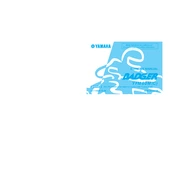Yamaha YFM80M C Badger 2000 Owner's Manual


The recommended oil type for the Yamaha YFM80M C Badger 2000 is SAE 10W-30 or 10W-40, designed for 4-stroke engines. Ensure that the oil is appropriate for the temperature conditions you will be operating in.
It is recommended to change the oil every 20 hours of operation or every 6 months, whichever comes first. Regular oil changes help maintain engine efficiency and longevity.
The correct tire pressure for the Yamaha YFM80M C Badger 2000 is 2.9 psi for both the front and rear tires. Proper tire pressure ensures optimal performance and safety.
To adjust the chain tension, first loosen the rear axle nuts, then adjust the chain adjusters evenly on both sides until the chain has about 10-20 mm of slack. Tighten the axle nuts securely once the adjustment is done.
If your Badger 2000 won't start, check the fuel level, ensure the kill switch is in the 'run' position, inspect the spark plug for fouling, and verify that the battery is charged. Address any issues found in these areas.
To clean the air filter, remove the filter cover, take out the air filter, and wash it with a mild detergent and water. Allow it to dry completely, then lightly oil the filter before reinstalling it.
The recommended spark plug for the Yamaha YFM80M C Badger 2000 is NGK C7HSA. Ensure that the gap is set correctly to 0.6 - 0.7 mm for optimal performance.
For winter storage, clean the ATV thoroughly, change the oil, add fuel stabilizer, disconnect the battery, and store it in a dry place. Cover the ATV to protect it from dust and debris.
To check the brake system, inspect the brake pads for wear, ensure the brake fluid is at the correct level, and check for any leaks in the brake lines. Test the brakes by applying pressure to make sure they engage smoothly.
Improving performance can be achieved by regularly maintaining the ATV, such as keeping the air filter clean, ensuring correct tire pressure, using high-quality fuel, and conducting regular engine tune-ups.